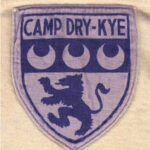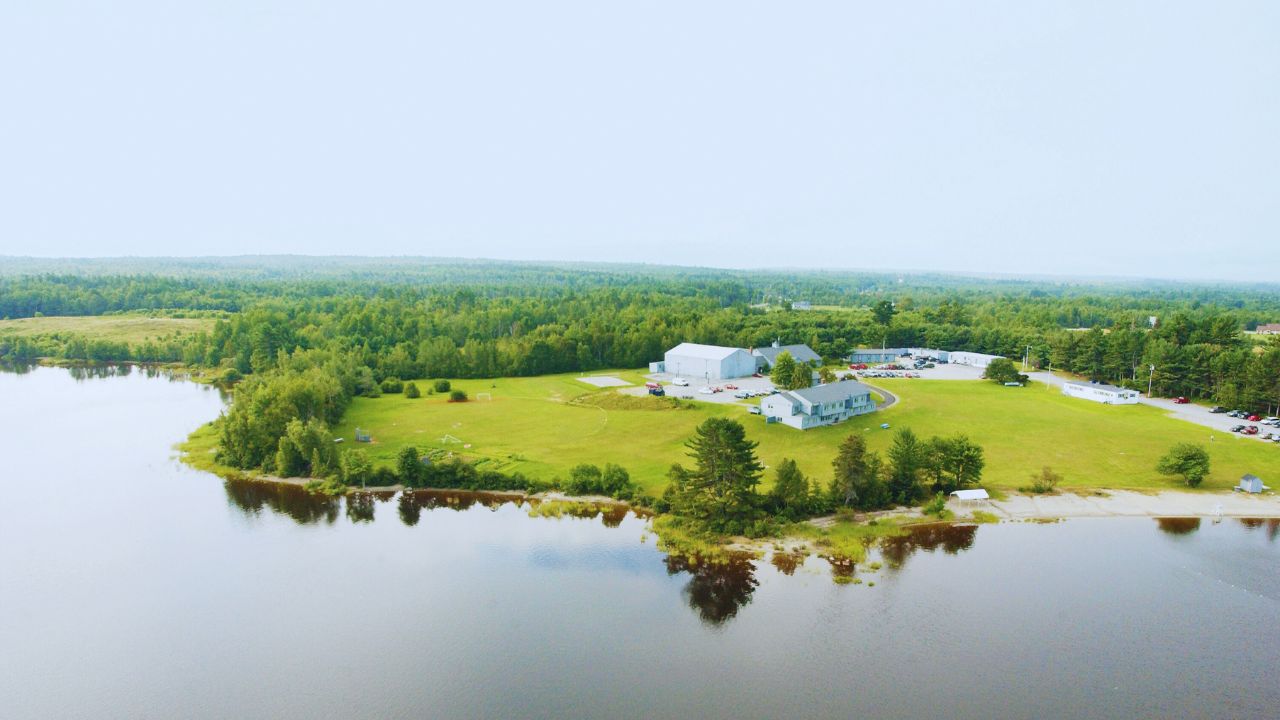The KidsPeace Graham Lake Campus in Ellsworth, Maine, opened in 1991, but the land on which it is located already had a rich history of helping youth, stretching back nearly 80 years. Those eight decades offer countless teachable moments and life lessons; could I find a hidden gem among them that still resonates with the work KidsPeace does today?
To find out, our journey begins in the summer of 1949.


 Camp Dry-Kye was a boys’ summer camp that operated in Ellsworth from 1949 to 1965. It was led by Ben Kimball and his wife, Betty. The camp is fondly remembered by those who attended or worked there, with more than 50 of the 238 kids who were campers, counselors, or workers still staying in touch sixty years after the camp closed.
Camp Dry-Kye was a boys’ summer camp that operated in Ellsworth from 1949 to 1965. It was led by Ben Kimball and his wife, Betty. The camp is fondly remembered by those who attended or worked there, with more than 50 of the 238 kids who were campers, counselors, or workers still staying in touch sixty years after the camp closed.
In November 2009, I was given the opportunity to speak at an event recognizing what would have been Ben Kimball’s 100th birthday. The night was filled with reminiscing and storytelling. The shared memories and sparked recollections filled the room with a youthful energy. It was evident that the impact Ben and Betty had on these men during their adolescence shaped their future selves in all aspects of their lives.
In preparation for the event, I reviewed a number of pages on a website devoted to the history of Camp Dry-Kye, and came across an exchange of letters involving Ben and a former camper a few years after the camp closed. The former camper shared what he was doing, and thanked Ben for his leadership and guidance.
Ben responded to the younger man with a letter of his own. One paragraph instantly connected with me, reminding me of the work we do with youth facing mental health challenges.
“Your work sounds rewarding in much the same way camp was – it gives you a chance to ‘leave your mark’. Better than making money and arousing envy and jealousy! People will remember your embassy* all their lives, and who knows how many you will awaken to the beauty and fullness of the mind for which we are intended – not as amassers of wealth and gadgets, which are slaves to any and all who are content with material things.”
*(The reference to an “embassy” suggests a role of representation or influence, perhaps in diplomacy, education, or community building, where one’s efforts resonate long after the moment passes.)
This passage speaks to the profound impact of meaningful work over the pursuit of wealth and materialism. It draws a parallel between the transformative experience of summer camp and a purposeful endeavor, such as the “embassy” mentioned, suggesting that both offer opportunities to leave a lasting, positive impression on others.
Summer camps, like Camp Dry-Kye, were often more than just recreational; they fostered personal growth, community, and memories that endure for a lifetime. Similarly, the quote implies that work with a deeper purpose—whether educational, cultural, or inspirational—can awaken individuals to the “beauty and fullness of the mind,” and leaves a legacy that outshines the temporary allure of “gadgets” and “wealth.”
For me, having spent more than twenty years working at the Graham Lake Campus, much of that time in direct care, this quote was the “hidden gem from the past” describing the opportunity we have to “leave our mark” in working with youth. There are countless examples to offer, ranging from managing a moment of crisis, to providing proper support to a child and their family, to understanding what a child is experiencing from the youth’s perspective.
Below are three such encounters, each an opportunity to “leave your mark.”
“I’m making a cool crash scene.”
An 11-year-old boy had just had a very distressing phone call with his mother. He immediately went into his bedroom and started throwing his model cars against the wall, destroying a dozen or so from his collection. When a staff person approached his doorway, he began yelling, wanting to be alone. With no imminent safety risk, we direct care workers continued to monitor from a distance.
After about 30 minutes, one staff person with a good rapport with the youth took a wooden board about a foot in length and a bottle of glue into the youth’s room. Without speaking a word, the staff person sat on the floor, began picking up the pieces of the cars strewn across the floor, and carefully glued the car parts together on the board. This continued for some time, with no attempt to engage the youth. After about 15 minutes, the youth asked in a gruff voice, “What are you doing?” The staff person responded by saying, “I’m making a cool crash scene. You can help me if you’d like.” Soon after, the youth got up from his bed, sat on the floor, and began sorting through the pieces.
Conversation started between the two, focused only on the activity at hand. Eventually, the staff person shifted the focus to the phone call. Now nearly an hour removed from the call, the youth was able to talk about what had upset him.
“People will remember your embassy all their lives…”
Every crisis offers the opportunity to strengthen the relationship between a youth and their caregiver. This moment of crisis for the youth was handled with creativity and initial silence. There was no rush to resolve it, understanding that this would only cause further escalation with an already agitated youth.
“You make me feel as though my child is the only child here.”
No matter the role, everyone has a part in ensuring youth and families are heard and supported. At times, it feels as though there are a thousand things happening simultaneously. Our job is to set aside the distractions and offer our full attention.
Several years ago, Graham Lake was putting together an overview video of the campus, which included a testimonial from a mother of a 13-year-old girl in our residential program. At that time, we were consistently at or near our 55-bed capacity.
During the recording of the mother’s testimonial, she mentioned how the KidsPeace case manager working with her daughter always made her feel as though her child was the only one on campus, even though she knew there were 54 other kids.
“Your work sounds rewarding…”
I recall hearing her words for the first time and thinking, “That’s it! That’s exactly how we want every parent to feel. Her compliment was the reward that makes our work meaningful and serves as the goal we all strive for in our communication with youth and families.
“I will never live in a place with a view as beautiful as this.”
The night before a 15-year-old male youth was transitioning from residential care back home, he sat quietly on his bed, looking out his window as the sun set over Graham Lake. A co-worker entered his room and asked the boy if he was okay. The youth said he was fine but stated he realized he would never live in a place with such a beautiful view.
“…it gives you a chance to ‘leave your mark.”
The co-worker spent considerable time discussing the treatment gains the youth had made during his stay and sought to understand the emotions he was feeling. The staff person could have easily walked past the room but chose to engage, talk, and, more importantly, listen. As he left the youth’s room, with the sun having long set, there was no doubt the staff person had seized the chance to leave his mark.
As we reflect on the legacy of Camp Dry-Kye and the enduring wisdom of Ben Kimball, it becomes clear that the true measure of our work at KidsPeace lies not in material success, but in the lives we touch and the positive impact we leave behind.
Like the counselors and campers of Camp Dry-Kye, KidsPeace staff have the privilege of guiding young people through their most challenging moments, helping them discover their own strength and potential. Each interaction, whether it’s a creative solution to a crisis, a moment of undivided attention, or a heartfelt conversation at sunset, is an opportunity not just to help these young people navigate their present struggles, but also to plant seeds for a future where they can thrive. In that way we ensure that the mark we leave is one of Hope, Help and Healing.






